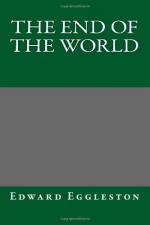“Looky here, Gus, don’t be a blamed fool. That’s a purty little game. That greeny’s got to learn to let blacklegs alone, and he don’t look like one that’ll take advice. Let him scorch a little; it’ll do him good. It’s healthy for young men. That’s the reason the old man don’t forbid it, I s’pose. And these fellows carry good shooting-irons with hair-triggers, and I declare I don’t want to be bothered writing home to your mother, and explaining to her that you got killed in a fight with blacklegs, I declare I don’t, you see. And then you’ll get the ‘old man’ down on you, if you let a bird out of the trap in which he goes snucks; you will, I declare. And you’ll get walking-papers at Louisville. Let the game alone. You haven’t got any hand to play against Parkins, nohow; and I reckon the greenhorns are his lawful prey. Cats couldn’t live without mice. You’ll lose your place, I declare you will, if you say a word.”
[Illustration: THE MUD-CLERK]
August stopped long enough to take in the full measure of his sacrifice. So far from being deterred by it, he was more than ever determined to act. Not the love Julia, so much, now, but the farewell prayer and benediction and the whole life and spirit of the sweet Moravian mother in her child-full house at home were in his mind at this moment. Things which a man will not do for the love of woman he may do for the love of God—and it was with a sense of moral exaltation that August entered into the lofty spirit of self-sacrifice he had seen in his mother, and caught himself saying, in his heart, as he had heard her say, “Let us do anything for the Father’s sake!” Some will call this cant. So much the worse for them. This motive, too little felt in our day—too little felt in any day—is the great impulse that has enabled men to do the bravest things that have been done. The sublimest self-sacrifice is only possible to a man by the aid of some strong moral tonic. God’s love is the chief support of the strongest spirits.
August touched Norman on the arm. The face of the latter expressed anything but pleasure at meeting him, now that he felt guilty. But this was not the uppermost feeling with Norman. He noticed that August’s clothes were spotted with engine-grease, and his first fear was of compromising his respectability.
In a hurried way August began to explain to him that he was betting with gamblers, but Smith stood close to them, looking at August in such a contemptuous way as to make Norman feel very uncomfortable, and Parkins seeing the crowd attracted by August’s explanations—which he made in some detail, by way of adapting himself to Norman—of the trick by which the upper card is thrown out first, Parkins said, “I see you understand the game, young man. If you do, why don’t you bet?”
At this the crowd laughed, and Norman drew away from the striker’s greasy clothes, and said that he didn’t want to speak any further to a burglar, he believed. But August followed, determined to warn him against Smith. Smith was ahead of him, however, saving to Norman, “Look out for your pockets—that greasy fellow will rob you.”




